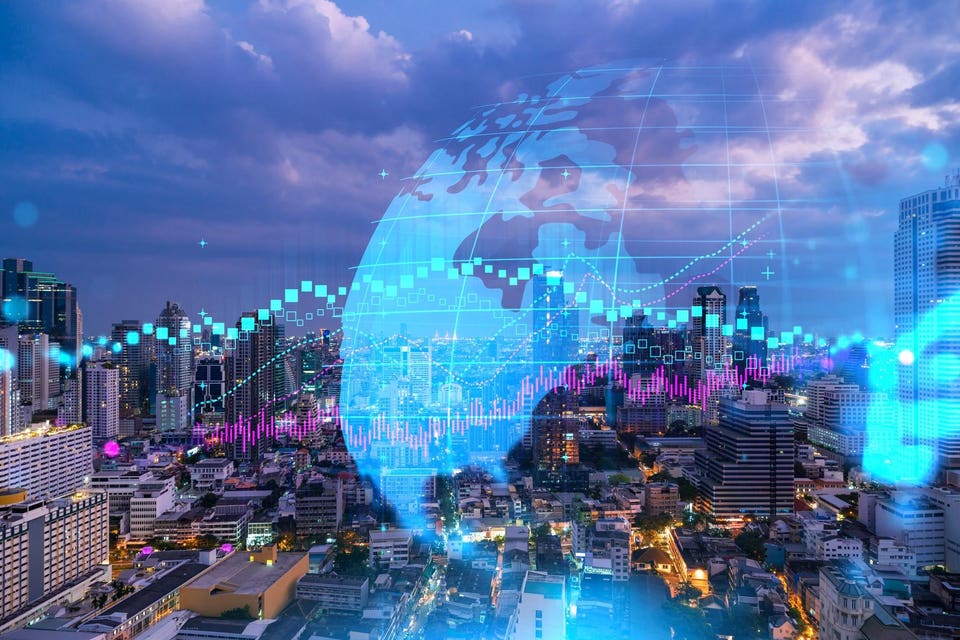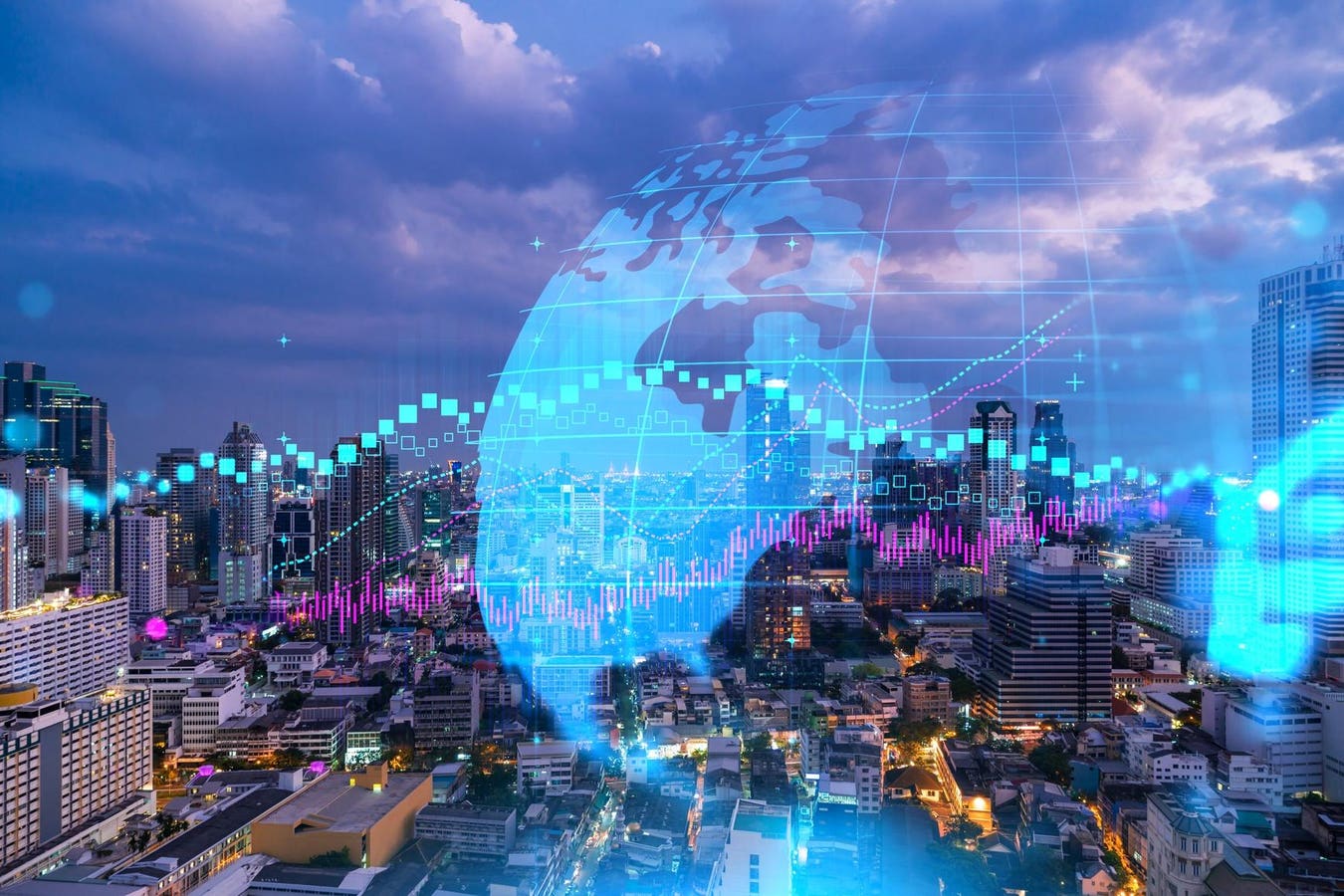
FOREX graph hologram, aerial night panoramic cityscape of Bangkok, the developed location for stock market researchers in Asia. The concept of fundamental analysis. Double exposure.
getty
Political volatility is no longer limited to emerging markets; it’s reshaping major economies as well, including the United States. That’s why Bangladesh’s recent political transition offers a timely case study in how markets endure — and even strengthen — when institutions, transparency, and resilient businesses hold steady. Bangladesh’s reset shows how countries can navigate uncertainty, protect growth, and build a more durable form of capitalism in an increasingly unpredictable world.
For years, the country was hailed as a development success: the next Asian tiger with millions lifted from poverty, exports booming, and a women-led workforce (44% female labor force participation compared to India’s 34%) powering one of the world’s fastest-growing economies. But the same growth masked rising concentration of power, weakening institutions, and an economy increasingly dependent on political favor.
That fragility came to a head in July and August 2024, when nationwide protests over corruption, inequality, and electoral legitimacy escalated into mass unrest. The government, long considered unshakable after 15 years in power, resigned under pressure — following a brutal crackdown in which the former prime minister was later held to account for ordering lethal force against civilians (including young people and children) and fled the country. (This week, she was sentenced to the death penalty for her misdeeds.) The subsequent transition left investors and institutions scrambling to assess what came next. In a matter of weeks, a political crisis exposed just how intertwined Bangladesh’s economic engine had become with its power structure.
For many, it felt less like a collapse than a long-overdue clearing of the field — the abrupt end of an era in which political patronage had distorted markets, and the start of a chance to rebuild on stronger footing. Since August 2024, the country has been governed by an interim administration led by Nobel Laureate Muhammad Yunus. The country now heads into a parliamentary election scheduled for February 2026, a moment of accountability and potential reset that could accelerate the reform-agenda.
Still, significant uncertainty remains. The upcoming election carries real risks — from questions about the credibility of the process to the policies that will follow. It also offers a rare opportunity: if the next government can deliver even incremental reforms in governance, transparency, and regulatory clarity, Bangladesh could emerge from this period stronger than it entered it.
Amid and despite the uncertainty, some enterprises continue to stand — those built on transparency, trust, and performance rather than proximity to power. These are the entrepreneurs and investors now positioned to shape Bangladesh’s next chapter — one we hope will be defined by accountability, innovation, and reform. As an entrepreneur who built a business from scratch in Bangladesh, I’ve learned that resilience in emerging markets isn’t about avoiding instability — it’s about enduring it. Sustainable growth depends not on politics, but on institutions, integrity, and the builders who keep going when everything else is in flux.
The Rise — and Reinvention — of a Development Darling
Bangladesh’s ascent was real — and remarkable. Manufacturing exports rivaled Vietnam’s, financial inclusion deepened, and private enterprise flourished despite infrastructure gaps and bureaucratic drag. But that success also revealed its limits. Growth became over-reliant on political patronage, a handful of industrial groups, and international goodwill that sometimes prioritized stability over governance.
The recent transition has brought those dependencies into focus. Rather than erasing the gains of the past two decades, it has opened a chance to rebuild the foundations beneath them — to strengthen institutions, diversify industry, and align growth more closely with transparency and accountability. Bangladesh’s development story isn’t unraveling; it’s evolving.
The Immediate Business Landscape
In the short term, uncertainty persists: some capital has moved to the sidelines, foreign-exchange volatility has disrupted imports, and certain investors remain cautious. Much of this caution is tied to the February 2026 election, which will shape everything from regulatory priorities to investor confidence. Until the political trajectory becomes clearer, businesses and investors must operate in an environment defined as much by uncertainty as by realignment.
Still, the World Bank remains optimistic that although GDP growth slowed due to the political upheaval it should pick up again in 2026, reflecting the underlying strength of the economy supported by stabilizing macro indicators, export demand, and renewed investor confidence. Across sectors, companies built on sound governance and professional management are proving resilient. Entrepreneurs who created value through product quality, trust, and operational discipline — not political access — are emerging as the country’s most credible corporate leaders. International partners are beginning to seek out precisely these firms, favoring transparency and sustainability over expedience.
The World Bank remains optimistic that although GDP growth slowed due to the political upheaval it should pick up again in 2026.
TBS News
This resilience is evident not only in macro indicators but in on-the-ground performance seen by long-term investors. Kerry Breen, Senior Director, Brummer & Partners, a private equity firm that has been invested in Bangladesh for more than a decade, points out: “The takeaway for global investors should be how incredibly resilient businesses, entrepreneurs and people generally are in Bangladesh. Barely two months after the revolution many businesses had largely regained pre-revolution levels of economic activity.”
Bangladesh’s economy is not in retreat; it is in realignment. The next growth cycle can be steadier, anchored in fundamentals rather than favor.
Lessons For Global Investors And Business Leaders
Lesson 1: Build Institutional, Not Personal, Partnerships
The old model of relationship-based access is giving way to rule-based engagement. In the new environment, resilience will come from partnerships anchored in governance, compliance, and long-term value creation.
Lesson 2: Political Stability ≠ Predictability
Autocratic control may offer short-term calm, but true predictability depends on pluralism and institutional strength. Investors who understand this distinction will be best positioned to navigate future volatility. One investor points out: “The companies that held up best were the ones that never relied on political protection in the first place.”
Lesson 3: ESG Begins with Governance
Environmental and social progress are hollow without accountable leadership. In frontier markets, “G” is not a compliance box — it’s a precondition.
Lesson 4: Local Entrepreneurs Are the Real Hedge
Founders with deep community trust and long-term commitment to their markets are the ultimate stabilizers. In moments of transition, they preserve jobs, innovation, and confidence when other systems falter.
The Reset: Opportunity Amid Transition
If Bangladesh can translate political change into institutional reform, it could usher in a more inclusive, innovation-driven economy. Several sectors are especially well placed to lead:
Health and education, where citizens have already shown greater trust in private innovation than in public systems, and digital revolutions are taking hold across urban and rural populations.Pharmaceuticals, buoyed by domestic manufacturing capabilities, export potential (several of the top pharmaceutical companies already export globally including to the US and EU markets), and a rising demand for chronic disease care.Renewable energy and climate resilience, where donor capital and private enterprise can finally align around adaptation, energy security, and infrastructure modernization.SME finance and women-led entrepreneurship, historically underfinanced but consistently resilient, even in crisis, and poised to benefit from more transparent rules and expanded digital financial services.
A transparent reset could also catalyze renewed diaspora engagement and sovereign investment, especially if the new government establishes credible pathways for capital repatriation and regulatory reform. In this moment of flux lies the chance to build a more balanced and sustainable capitalism — one defined by integrity as much as growth.
Investors with long experience in the market see the transition not as a deterrent but as a strategic opening. Kerry Breen of Brummer highlights: “Investors who know the market and get the demographic and economic trends here are willing to place long-term bets regardless of the election cycle.” Asif Khan, Chairman, EDGE Asset Management, which invests in the public markets, echoes this sentiment: “We are fully invested. Any pickup in economic growth will lead to a strong rally.”
The upcoming February 2026 election will be pivotal. Investors are watching not only who forms the next government, but whether it delivers on long-awaited reforms: strengthening regulatory transparency, reinforcing oversight institutions, and creating predictable rules of the game. If even some of these reforms materialize, Bangladesh’s next growth cycle will be more stable and more inclusive.
Even if progress is slower than hoped, the country’s strongest enterprises have shown they can thrive regardless — powered by fundamentals that continue to drive demand, innovation, and growth: a young population, a strong export sector, rising domestic consumption, and a remarkably entrepreneurial private sector. The most resilient companies remain steadfast in their commitment to customers while staying agile enough to adapt to shifting market demands — even in periods of turbulence and uncertainty.
A Broader Lesson — And A Global Mirror
Bangladesh’s experience is not an anomaly; it is a preview. Across emerging markets, the most enduring economies will be those that marry growth with governance. Political change need not derail development — it can strengthen it when reformers and responsible investors move in step. When business leaders demand transparency, model ethics, and invest in systems rather than shortcuts, the private sector becomes a stabilizing force rather than a silent bystander.
The same holds true far beyond Dhaka. Bangladesh is one example of a much broader pattern across emerging markets in Asia and Africa — rapid growth layered on top of institutional fragility and shifting social contracts. The question now is which countries will channel this moment into real reform and more resilient forms of capitalism.
And this is not just an emerging-market story. In an era of institutional strain and political polarization — from Dhaka to Washington, DC, and beyond — businesses everywhere face the same choice: rely on access and influence, or help rebuild the systems that make markets work.
For global business, the message is clear: durable progress depends not on who holds power, but on how institutions are governed. Bangladesh’s next chapter will reveal whether economic growth can finally be decoupled from political patronage — and if it succeeds, it will offer a blueprint for resilience far beyond its borders.
The question for all of us — entrepreneurs, investors, policymakers, and citizens — is whether we can build markets that endure beyond the individuals who govern them. Bangladesh stands as both a warning and an opportunity to prove that we can.

